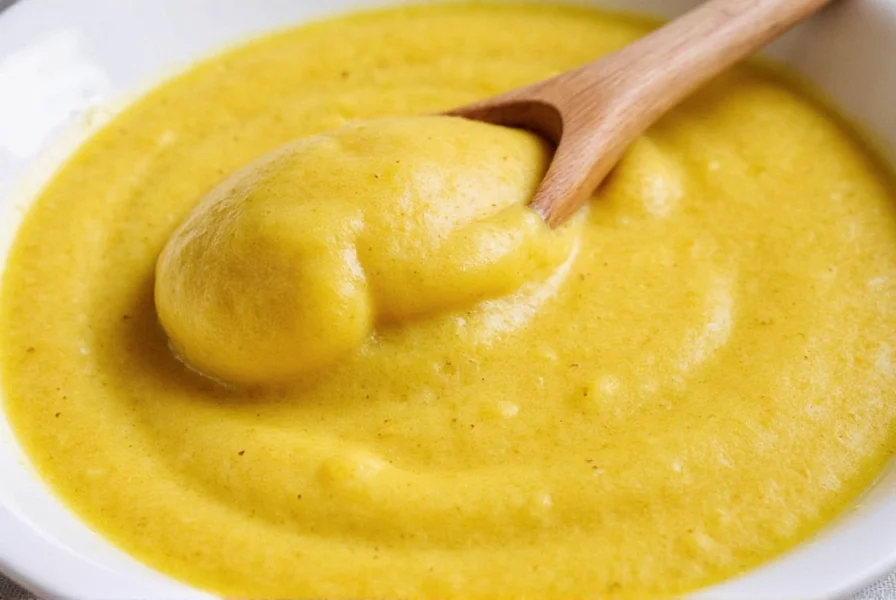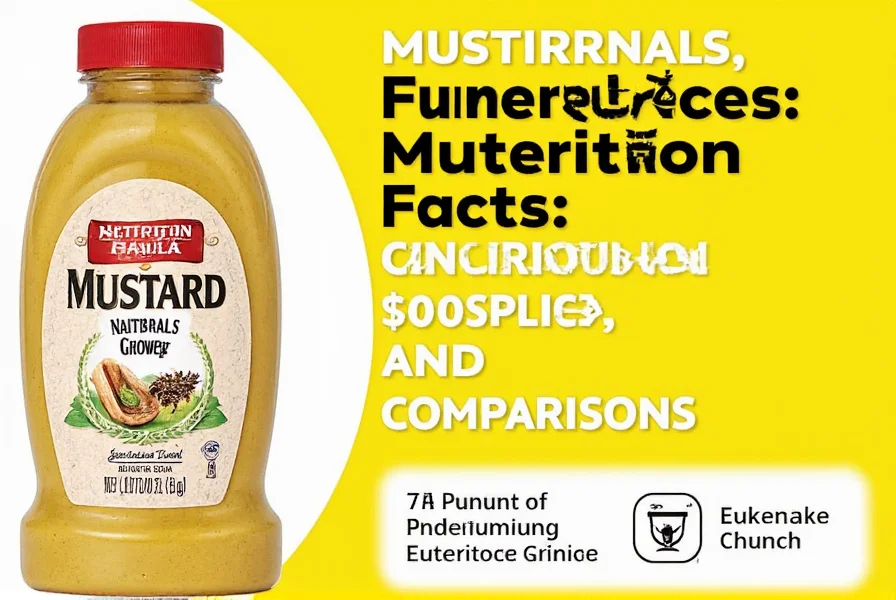When examining the nutritional value of mustard, it's important to understand how this popular condiment contributes to a balanced diet. As one of the lowest-calorie flavor enhancers available, mustard provides distinctive taste without significant caloric impact. This makes it an excellent choice for those monitoring their dietary intake while seeking flavorful meal options.
Nutritional Profile of Common Mustard Varieties
Understanding the specific mustard nutrition facts per tablespoon helps consumers make informed choices. The table below compares key nutritional elements across popular mustard types:
| Nutrient | Yellow Mustard (1 tbsp) | Dijon Mustard (1 tbsp) | Whole Grain Mustard (1 tbsp) |
|---|---|---|---|
| Calories | 3-5 | 5-10 | 10-15 |
| Total Fat | 0g | 0g | 0.1g |
| Sodium | 50-120mg | 100-150mg | 80-130mg |
| Carbohydrates | 0.5g | 1g | 1.5g |
| Sugar | 0g | 0.1g | 0.2g |
| Protein | 0.1g | 0.2g | 0.3g |
| Selenium | 2% DV | 1.5% DV | 2.5% DV |
| Magnesium | 1% DV | 1% DV | 1.5% DV |
Health Benefits of Mustard Components
The nutritional benefits of yellow mustard primarily come from its key ingredients. Turmeric, which gives yellow mustard its distinctive color, contains curcumin—a compound with well-documented anti-inflammatory properties. Research published in the Journal of Medicinal Food indicates curcumin may help reduce inflammation markers in the body.
Mustard seeds themselves contain glucosinolates, sulfur-containing compounds that may offer cancer-protective effects according to studies in the journal Cancer Prevention Research. When mustard seeds are crushed and mixed with liquid, the enzyme myrosinase activates these compounds, potentially enhancing their bioavailability.
Vinegar, another common mustard ingredient, may contribute to blood sugar regulation. A study in Medscape General Medicine suggests vinegar consumption can improve insulin sensitivity after meals, making mustard a potentially smart choice for those monitoring glucose levels.

Comparing Mustard to Other Condiments
When evaluating mustard vs ketchup nutrition, the differences are substantial. While one tablespoon of ketchup typically contains 15-20 calories and 4 grams of sugar, mustard provides similar flavor intensity with minimal calories and virtually no sugar. This makes mustard a superior option for those pursuing weight management goals.
The question "is mustard good for weight loss" has a positive answer when considering its nutritional profile. With only 3-15 calories per serving depending on variety, mustard adds flavor without significant caloric impact. Registered dietitians often recommend mustard as a smart swap for higher-calorie condiments when creating sustainable weight loss plans.
Practical Dietary Applications
Incorporating mustard into your diet offers flavor without compromising nutritional goals. Try these practical applications:
- Use as a base for healthy salad dressings instead of mayonnaise-based options
- Add to marinades for lean proteins to enhance flavor without added calories
- Mix with Greek yogurt for a protein-rich dipping sauce
- Stir into soups and stews for depth of flavor without extra fat
- Use as a sandwich spread alternative to high-calorie options
For those concerned about sodium content, look for reduced-sodium varieties or make homemade mustard using mustard seeds, vinegar, and minimal salt. The health benefits of mustard seeds remain valuable even with sodium adjustments.

Addressing Common Misconceptions
Some believe mustard lacks nutritional value due to its low calorie count. However, the vitamins in mustard, while present in small amounts, contribute to overall nutrient intake when consumed regularly. Selenium, found in mustard seeds, supports thyroid function and acts as an antioxidant.
Another misconception is that all mustards are nutritionally identical. In reality, preparation methods significantly impact nutritional content. Stone-ground mustards retain more whole seed material, potentially offering slightly higher fiber and nutrient content compared to smooth varieties.
Frequently Asked Questions
Does mustard have any significant vitamins or minerals?
Mustard contains small but meaningful amounts of selenium (about 2% of daily value per tablespoon), which supports thyroid function and acts as an antioxidant. It also provides trace amounts of magnesium, calcium, and potassium. While not a primary source of vitamins, the turmeric in yellow mustard offers curcumin with anti-inflammatory properties.
Is mustard suitable for low-sodium diets?
Most standard mustards contain 50-150mg of sodium per tablespoon, which is relatively low compared to many condiments. For strict low-sodium diets, look for reduced-sodium varieties or make homemade mustard with minimal salt. Mustard generally remains a better option than ketchup, mayonnaise, or soy sauce for sodium-conscious eaters.
How does mustard compare nutritionally to other common condiments?
Mustard significantly outperforms many popular condiments in nutritional value. While one tablespoon of ketchup contains about 15 calories and 4g sugar, mustard provides similar flavor intensity with only 3-15 calories and virtually no sugar. Compared to mayonnaise (90-100 calories per tablespoon), mustard offers dramatic calorie savings while still providing robust flavor.
Can mustard contribute to digestive health?
Yes, mustard may support digestive health in several ways. The vinegar content can stimulate digestive enzymes, while mustard seeds contain compounds that may promote healthy gut bacteria. Some traditional medicine systems use mustard as a digestive aid, though scientific research specifically on mustard's digestive benefits remains limited compared to other fermented foods.
Does the type of mustard affect its nutritional value?
Yes, different mustard varieties have distinct nutritional profiles. Yellow mustard typically contains turmeric for color and mild flavor. Dijon mustard often has slightly higher calorie content from added ingredients. Whole grain mustards retain more intact seeds, potentially offering marginally higher fiber and nutrient content. Spicy brown mustards may contain additional spices with their own health properties. The base nutritional profile remains consistently low-calorie across varieties.











 浙公网安备
33010002000092号
浙公网安备
33010002000092号 浙B2-20120091-4
浙B2-20120091-4